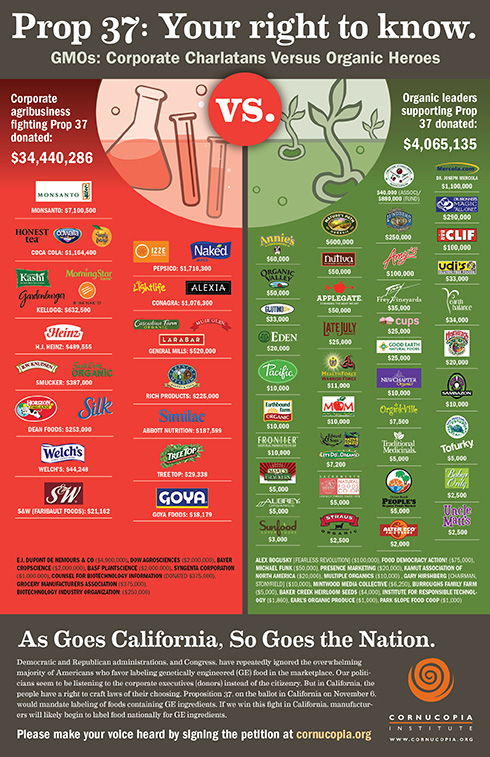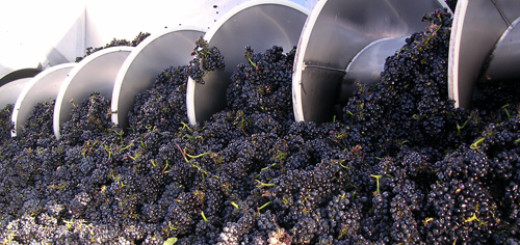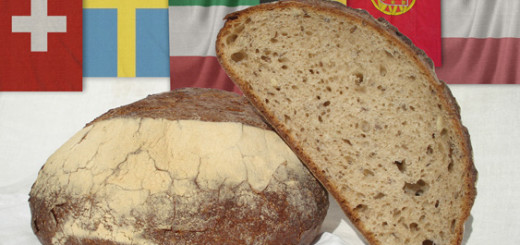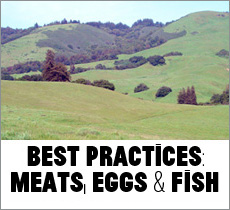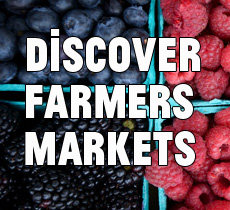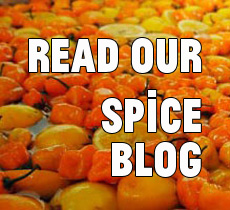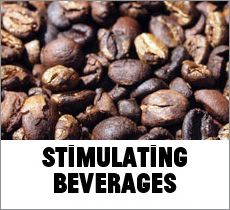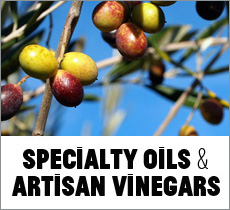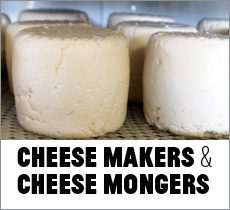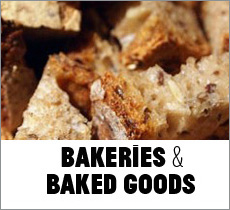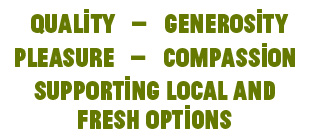G-M-nO Thanks: Yes to Our Right to Know
We recently visited the National Heirloom Exposition in Santa Rosa, California, a fascinating event for lovers of heirloom & heritage varieties of edible plants & animals. The bedrock foundation of the Heirloom Expo: to celebrate the diversity of world heirloom produce and heritage animal breeds as pure food that’s not been genetically modified and to honor foods that centuries of farmers have improved through selection into their perfect, pure state, from way before Gregor Mendel’s time to today.
Historical Threads and the Thread of Seed History
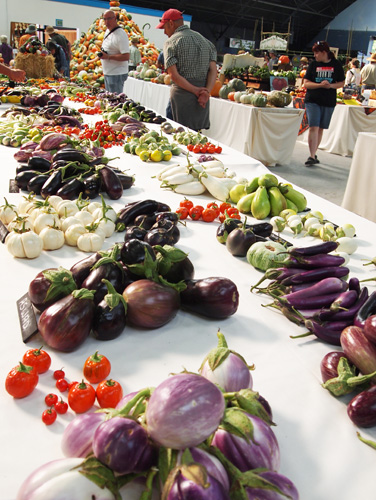
Mr. Spice checks out the heirloom eggplants
Jere and Emilee Gettle and the folks at Baker Creek Heirloom Seeds have planned and produced the National Heirloom Expo for the past three years. Their goal is twofold: to celebrate heirloom/heritage plants and animals as well as defend our human and civil rights to choose to eat GMO-free plant and animal organisms, especially plants engineered to resist toxic weed killers dispersed with abandon on conventionally-grown crops.
Whether at their Baker Creek home base near Mansfield, Missouri; the Petaluma Seed Bank in Petaluma, California; or Comstock, Ferre & Co.in Wethersfield, Connecticut, the pure food advocates of Baker Creek wear period clothing from a pre-industrial agriculture era to help reconnect citizen-consumers with an earlier time when families could feed themselves with produce grown with seed saved from decades and centuries of selection. Pre-industrial agriculture respected farmers, laborers, and the environment far more than today’s mechanized-corporatized-subsidized industrial agriculture system.
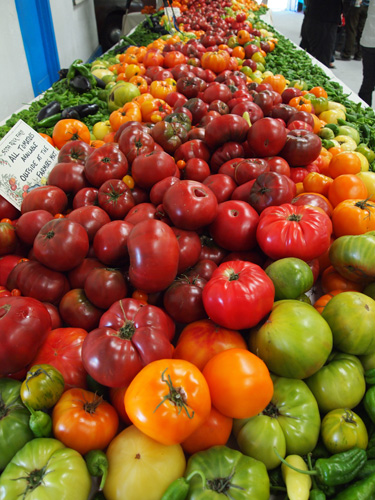
A tomato sculpture of the Russian River
Carefully and creatively displayed organic fruit, veg, and herbs covered the many tables that filled the hall with rarely-seen heirloom specimens. Sonoma County’s Russian River was created entirely out of colorful heirloom tomatoes. Beautiful, unique eggplants, garlics, plums, peppers, melons, and more filled the many tables in the produce expo hall while a squash mountain climbed dozens of feet into the air. Hanging at one end of the Expo hall was a huge banner from the Cornucopia Institute identifying which businesses were on which side of the Proposition 37 issue, the Label GMO$ “Right to Know” proposition. At the top of the list, Monsanto donated over $7 million to try and convince Californians to defeat the labeling proposition in November 2012.
On the third day of the National Heirloom Expo visitors and participants lined up for an array of tastes, from rare plums to exotic melons. The National Heirloom Expo is one of the only places in the world the general public of citizen-consumers have a chance to taste dozens and dozens of different, unique varieties at one time. Thanks to all the farms and farmers who donated part of their harvests to this tasting event, especially Andy’s Orchard in Morgan Hill who cultivates the plum I now want in our garden: the Broken Heart. Yums plums!
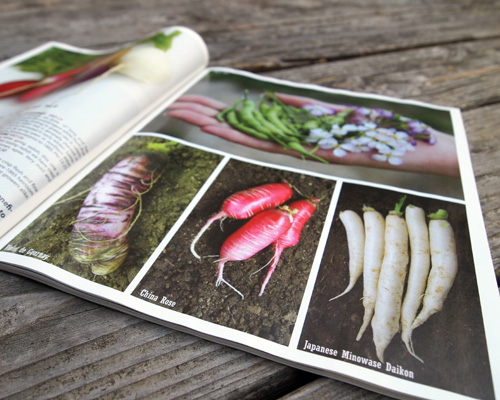
Baker Creek heirloom seed catalog
Organic agriculture selects for positive traits focused on flavor, nutrition, and health while conventional agriculture heads to the lab to create genetically modified seeds with Roundup resistance so producer/patent-holder Monsanto can sell both seeds and herbicide to farmers around the world forever and ever, The End. Delicious, beautiful varietals that splash through every page of the Baker Creek Heirloom Seeds catalog and crowd the tables in the National Heirloom Expo hall in Santa Rosa are in danger from an agriculture system that ignores the effect of GMO crops on heritage varietals that many of us wish to keep free from the genetically-corrupting contagion of GMO drift.
Proposition 37: Right to Know about GMO$
Why might we want to know which foods contain GMO$? One need only scratch the surface of Google to reveal the many drawbacks to world-wide cultivation of GMO crops. In the film The World According to Monsanto (2008), French director Marie-Monique Robin clicks through a long list of online sources to explore how GMO$ affect world agriculture through select case studies of GMO-technology implementation. This film is terrifying: ancient corn strains in Mexico at risk of contamination from GMO drift, United States farmers whose fields fall prey to Monsanto’s unwanted agricultural drift into their non-GMO fields at risk from the aggressive litigiousness of Monsanto, the health effects of consuming GMO foods such as Bovine Growth Hormone for both humans and animals, the disaster of BT corn in India, and sadly so much more.
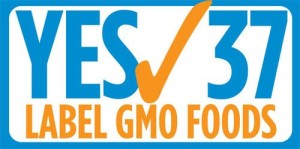 NPR reported in March 2012 in a piece called “Why Monsanto Thought Weeds Would Never Defeat Roundup” how the scientists involved in creating Roundup Ready seeds couldn’t imagine that nature could adapt to this genetic modification because it had been so hard for the scientists to make it work in the lab. And then nature adapted within 1-2 decades. Seriously, scientists: stop underestimating nature. When it comes to widespread use of GMO ingredients in food products, what else might the scientists not have imagined could happen with humans and other animals eating genetically-modified foods? Proposition 37 requires labeling of products that contain GMO$ so we have the right to know what’s in our food and have the right to support GMO-free agriculture.
NPR reported in March 2012 in a piece called “Why Monsanto Thought Weeds Would Never Defeat Roundup” how the scientists involved in creating Roundup Ready seeds couldn’t imagine that nature could adapt to this genetic modification because it had been so hard for the scientists to make it work in the lab. And then nature adapted within 1-2 decades. Seriously, scientists: stop underestimating nature. When it comes to widespread use of GMO ingredients in food products, what else might the scientists not have imagined could happen with humans and other animals eating genetically-modified foods? Proposition 37 requires labeling of products that contain GMO$ so we have the right to know what’s in our food and have the right to support GMO-free agriculture.
Confused NO on 37 People? Have Some Answers

Is it really that confusing?
“They’re at it again!” exclaims an exasperated narrator in a Reagan-ish voice on an anti-Prop 37 radio spot. The ad decries government regulation and warns of vague associated costs for consumers if Proposition 37 is approved by the voters in November. This primarily Monsanto-funded opposition to Proposition 37 plays into Tea Party-esque fears of excessive government regulations and wasteful, confusing bureaucracy. It also counts on low-information voters identifying with ad characters confused with Proposition 37. How confused? A confused man with an enormous steak in one hand and huge can of what appears to be dog food in the other asks “So dog food would need a label but my steak wouldn’t? What’s the deal with Prop 37 regulations?” Confused Man: because dog food is largely made of grain products and fillers produced from GMO seeds, it must carry a “Made with GMO$” label. Do you really think dog food is primarily made of meat these days? A portion of steak, however, will not need a label even though the animal that contributed that steak was fed genetically-modified grains in a feedlot. That’s how the proposition was written. Is that really confusing to you? Here’s the full text of the proposition. Next question?
 “Why would this pizza need to be labeled, but this pizza wouldn’t?” asks one ad with two copies of a pizza stock photo. Well, apparently one pizza contains ingredients produced from genetically modified seeds resistant to the copious amounts of Roundup herbicide sprayed on the fields during the growing season which impacts water quality, air quality, and the health of the soil. The other slice of pizza contains GMO-free wheat, tomatoes, onions, and other ingredients that weren’t saturated with increasing amounts of toxic synthetic fertilizer during the growing season. That’s why one should be labeled as containing GMO$; this labeling will also help explain the difference in price for these two slices of pizza. Confused people: can you not see the difference between produce cultivated with Roundup Ready seeds and herbicides and produce produced without Monsanto seeds and herbicides? Many Californians and Americans across the country can see the difference and we want to know what’s in our food. Next question?
“Why would this pizza need to be labeled, but this pizza wouldn’t?” asks one ad with two copies of a pizza stock photo. Well, apparently one pizza contains ingredients produced from genetically modified seeds resistant to the copious amounts of Roundup herbicide sprayed on the fields during the growing season which impacts water quality, air quality, and the health of the soil. The other slice of pizza contains GMO-free wheat, tomatoes, onions, and other ingredients that weren’t saturated with increasing amounts of toxic synthetic fertilizer during the growing season. That’s why one should be labeled as containing GMO$; this labeling will also help explain the difference in price for these two slices of pizza. Confused people: can you not see the difference between produce cultivated with Roundup Ready seeds and herbicides and produce produced without Monsanto seeds and herbicides? Many Californians and Americans across the country can see the difference and we want to know what’s in our food. Next question?
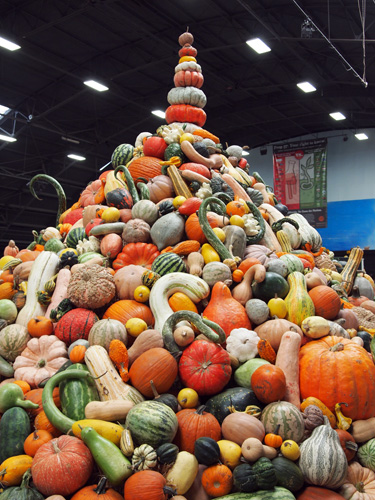
Winter Squash, National Heirloom Expo 2012
This advertising campaign dramatically minimizes scientifically-determined health threats about GMO foods. Why have Monsanto and other supporters of this measure poured so very much money into defeating this ballot proposition? Already over 70% of processed foods produced in the United States contain GMO ingredients. Citizen-consumers around the world outside of North America have voted with their dollars to purchase non-GMO foods. Why do Californians not have the same right to make our own choices to support the type of agriculture we wish to promote, be it local, organic, or heirloom?
Fortunately, the odds are good for a majority of voters supporting Proposition 37 in California on election day. From Upton Sinclair’s The Jungle to Pink Slime today, citizen-consumers don’t respond well to food production that’s allowed to get too dangerous. Be sure to vote and share your reasons with friends and family about why they should also vote yes on Proposition 37 to ensure California’s citizen-consumers have a right to know what’s in their food. Thanks!

